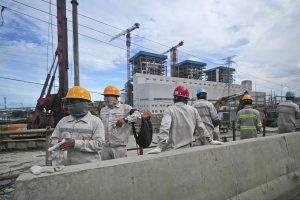Indonesia’s government says that it plans to increase supervision of its commodities sector, after the U.S. Department of Labor declared the presence of forced labor in the country’s nickel industry.
On Friday, Yuli Adiratna, a senior official in the Ministry of Manpower, told Reuters that the government would look into the findings of the report and improve “supervision of regulations and international standards” in the commodities sector.
Yuli did not offer any details about what this would entail, but the U.S. ruling, which was handed down on September 10, could have significant impacts on Jakarta’s goal of transforming itself into a global hub of electric vehicle (EV) manufacturing.
Indonesia is one of the world’s largest producers of nickel, a crucial part in the production of the large lithium-ion batteries that power EVs. Most nickel mining and processing takes place on the island of Sulawesi, in large industrial parks dominated by Chinese companies. According to Benchmark Mineral Intelligence, an estimated 80-82 percent of Indonesian battery-grade nickel output this year is expected to come from majority Chinese-owned producers.
On September 10, the Department of Labor added Indonesian nickel to its list of goods produced by child or forced labor, citing “multiple reports that adults are forced to work in the production of nickel in Indonesia.”
The report stated that the industrial parks of Sulawesi employ an estimated 6,000 Chinese migrant workers in various capacities. The Department cited NGO reports as saying that these workers “are often deceptively recruited in China” and receive a “lower wage than promised along with longer work hours.”
“Workers regularly have passports confiscated by employers and experience arbitrary deduction of wages, as well as physical and verbal violence as means of punishment,” the report added. It also said that a number of other indicators of forced labor, including restriction of movement, isolation, constant surveillance, and forced overtime, were “reportedly common practices in the production of nickel in the industrial parks.”
The ruling has significant implications. As Cullen Hendrix wrote in these pages last week, the forced labor ruling “deals yet another blow to the country’s aspirations to secure a critical minerals-specific free trade agreement (CMS-FTA) with the United States.” Such an agreement is a condition for having Indonesia’s nickel included in the supply chains recognized by the Biden administration’s Inflation Reduction Act (IRA).
Under the IRA, Washington has required that a certain amount of critical minerals in EV batteries be produced or assembled in North America or in a country with which the U.S. has an FTA, for EVs sold in the United States to be eligible for tax credits. The credit will not apply to EVs containing batteries and critical minerals sourced from “foreign entities of concern,” including some companies with more than 25 percent Chinese ownership.
For more than a year, Jakarta has been negotiating a CMS-FTA pact with Washington in a bid to qualify for IRA subsidies along the lines of the agreement brokered with Japan in March 2023. However, the domination of the industry by Chinese firms, and the poor labor, environmental, and social safeguards associated with the large Chinese mining and smelting operations in Sulawesi, have complicated the matter.
In October of last year, nine U.S. senators sent out a bipartisan letter addressed to the U.S. trade representative, and secretaries of treasury, energy, and commerce, expressing concerns regarding the proposed CMS-FTA with Indonesia. In so doing, they referenced not only the Chinese dominance of the country’s mining industry, but also the poor labor standards and deleterious environmental impacts that have been linked with these Chinese operations. Cullen argued that the Labor Department’s forced labor ruling does not have any pressure, but will now make the issue of forced labor “the starting point for any further discussion of a CMS-FTA between Indonesia and the United States.” To this extent, it probably makes such an agreement less likely.
There is some sign that the Indonesian government recognizes the problems in its nickel industry and is attempting to address them. President Joko Widodo has promised on several occasions to improve the standards of Indonesia’s nickel mining and smelting operations. In July, the Financial Times published a report claiming that the Indonesian government “is trying to reduce Chinese investment in new nickel mining and processing projects to help its industry qualify for tax breaks in the U.S.”
Whether either of these efforts will be sufficient remains unclear, but the current listing is likely to complicate matters. As so often, U.S. policy on this matter presents a mix of moral and strategic goals: support for high standards in extractive industries, and the desire to erode China’s dominant position in EV supply chains. U.S. policymakers could mount a case that in the case of Indonesia, these two goals are mutually reinforcing, since Chinese mining firms operate to much lower standards than firms from allied and partner countries.
Even so, to the extent that the listing complicates Indonesia’s ability to negotiate a CMS-FTA with the U.S. government, and hence attracts Western firms keen to access IRA tax incentives, it will also complicate its ability to diversify its nickel industry. The paradoxical result, Cullen concluded, “will be to push Indonesia further into dependence on China and Chinese firms.” At this point, meaningful progress on forced labor will become much less likely.
































